Milan — the second largest city in Italy, the capital of Lombardy, but above all, a city of business and fashion. All this holds true for this beautiful and vibrant Italian metropolis, home to the renowned La Scala opera, two football clubs AC Milan and Inter Milan, and where you can enjoy a breathtaking view of the famous Duomo Cathedral. In our article, you’ll discover what to see and do in Milan, where to stay strategically, and when to visit. In this guide, I’ll share with you Milan, Italy: 37 Best Things to Do and See.
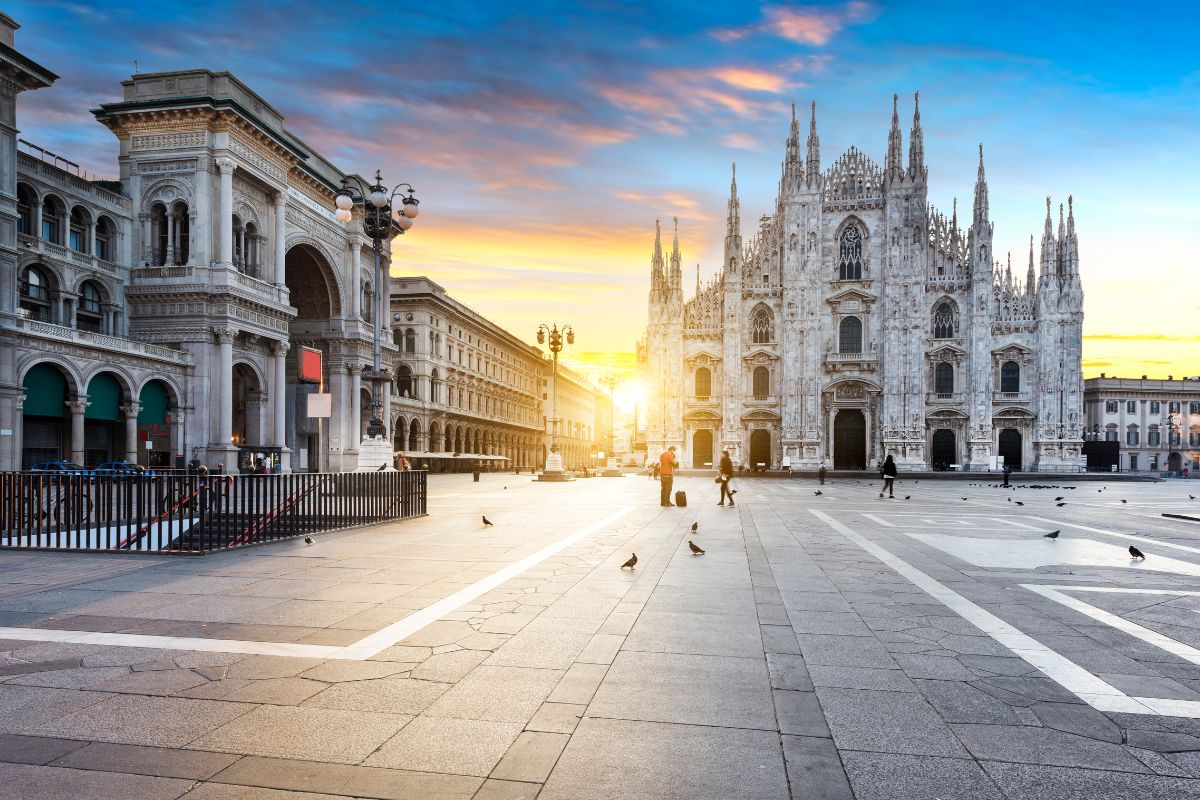
Milan: when to Visit the City of Fashion
You’ll experience pleasant temperatures in Milan from March to June. Of course, you can also visit Milan during the peak summer season, but the heat can sometimes be unbearable in the city.
Winter months in Milan are colder, but not as cold as in the Czech Republic. 😊 So don’t be afraid to take a Christmas trip, for example.
Where to Stay in Milan
To avoid too much commuting, I recommend staying in the city center. However, the closer to the center, the higher the accommodation price. Check out the following accommodation tips in Milan:
- Room Mate Giulia (luxury option),
- Missori Suites (mid-range option),
- Bamboo Milano Sinatra Apartment (budget option) or Residence Lepontina, which is further from the center.
You can find more tips in our article with the 10 best hotels in Milan.
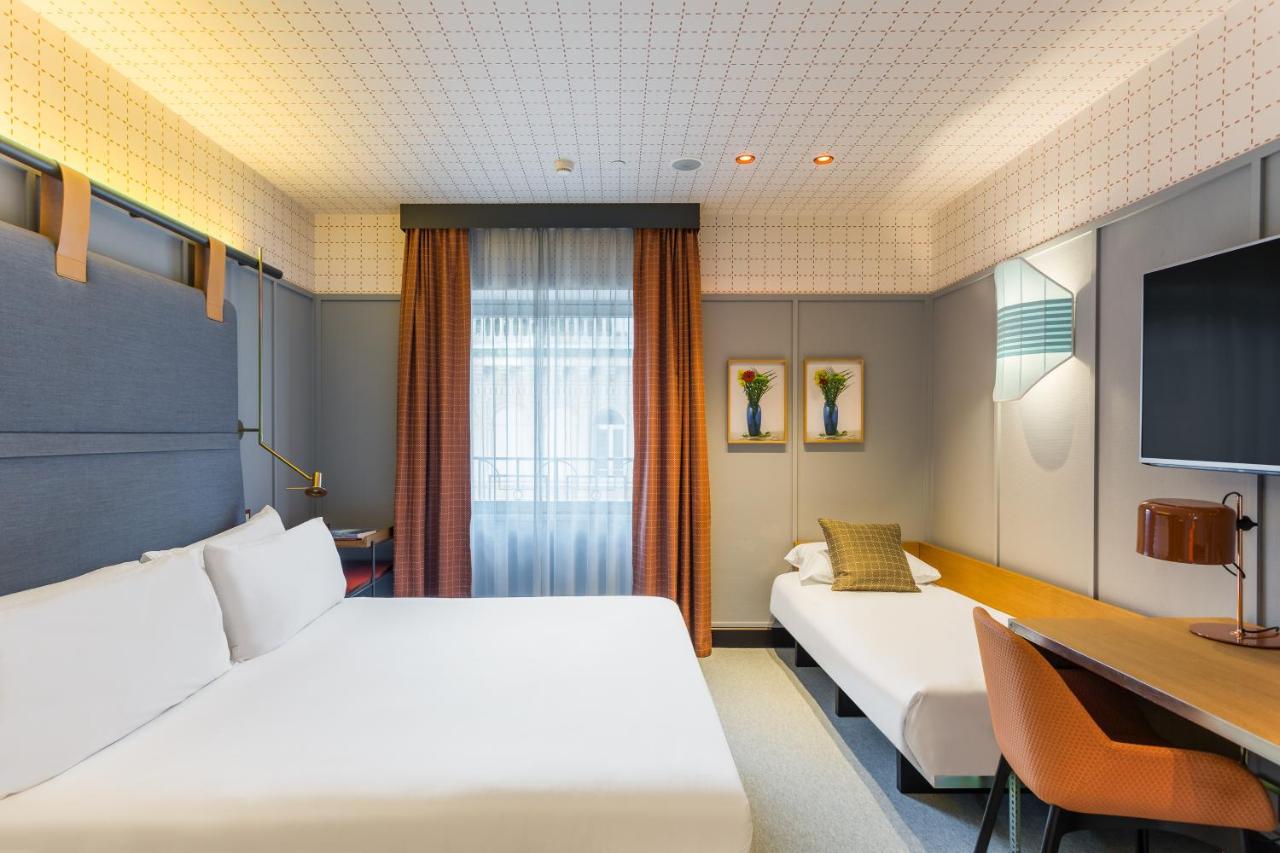
How to save up to 70% on Admission in Milan?
Admission to attractions in Milan is not exactly the cheapest, so we recommend buying the Milan City Pass, which will save you up to 70% on admission and also allow you to use unlimited public transport for three days.
What the Milan City Pass offers:
- Save up to 70% on admission to attractions in Milan,
- The City Pass is fully digital and always available on your phone.
- You can use unlimited public transport (buses, trams, metro) in zones Mi1-Mi3 for 3 days.
- Skip the lines when buying tickets.
- Includes admission to the Duomo, Sforza Castle museums, the city aquarium, and much more.
- Transportation from Milano Linate Airport and back via metro line 4 (Linate-San Babila).
- Additional discounts through the YesMilanoPass app.
- Admission to other museums including the Gallery of Modern Art (GAM), Archaeological Museum, Museo del Novecento, Natural History Museum, and the option to visit one additional museum of your choice.
Milan, Italy: 37 Best Things to Do and See
Do you already have your flights to Milan booked and can’t wait for your next adventure? Are you planning what to see and putting together an itinerary? Then I might be able to help you with that. I’ve put together 37 tips on what to see and do in Milan for you.
Duomo Di Milano
The landmark that everyone must associate with Milan is the majestic Duomo Cathedral. It is one of the largest Gothic cathedrals in the world. Construction began in the 14th century and was completed only in the 19th century. The Duomo is known for its rich Gothic architecture, sculptures, and has an impressive 135 spires.
Personally, I’m not much into churches and cathedrals, but the one in Milan is truly magnificent and breathtaking. I think everyone should see it at least once in their lifetime.
Duomo di Milano is located in the city center, in Piazza del Duomo. And what I would definitely recommend to everyone is a tour of the cathedral’s rooftop terrace, from where there is a magnificent view.
TIP: If you don’t want to queue for tickets, buy them online via GetYourGuide.
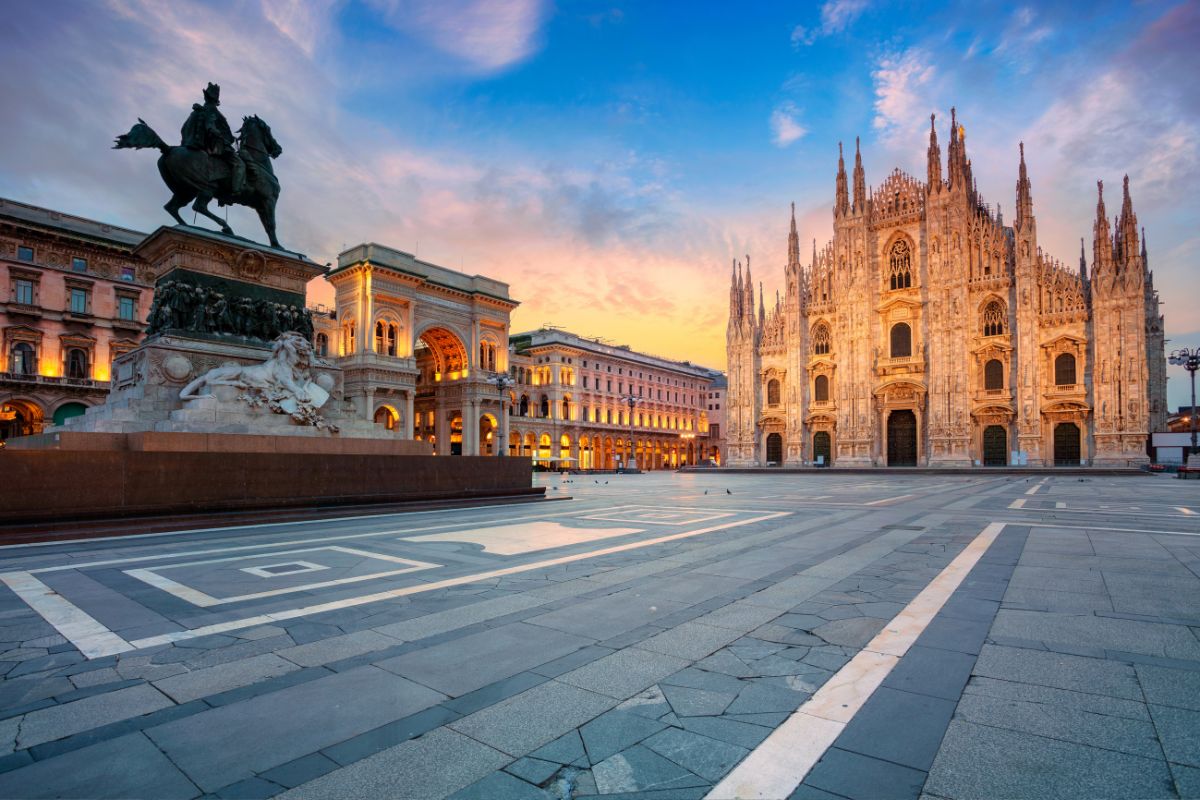
Where to Buy Tickets
The cathedral is open to the public daily from 9 AM to 7 PM (last entry at 6:00 PM). You can explore both the interiors and the rooftop, or a combination of both. Then you can also choose whether to take the elevator to the roof or walk up.
You can buy tickets on the official website, but if you want to skip the queue, purchase them on GetYourGuide.
Ticket prices are:
- Cathedral interior tour + Duomo Museum: 8 euros,
- rooftop terrace tour (by stairs): 13 euros,
- rooftop terrace tour (by elevator): 15 euros,
- interior + terrace by stairs + Duomo Museum: 16 euros,
- interior + terrace by elevator + Duomo Museum: 22 euros
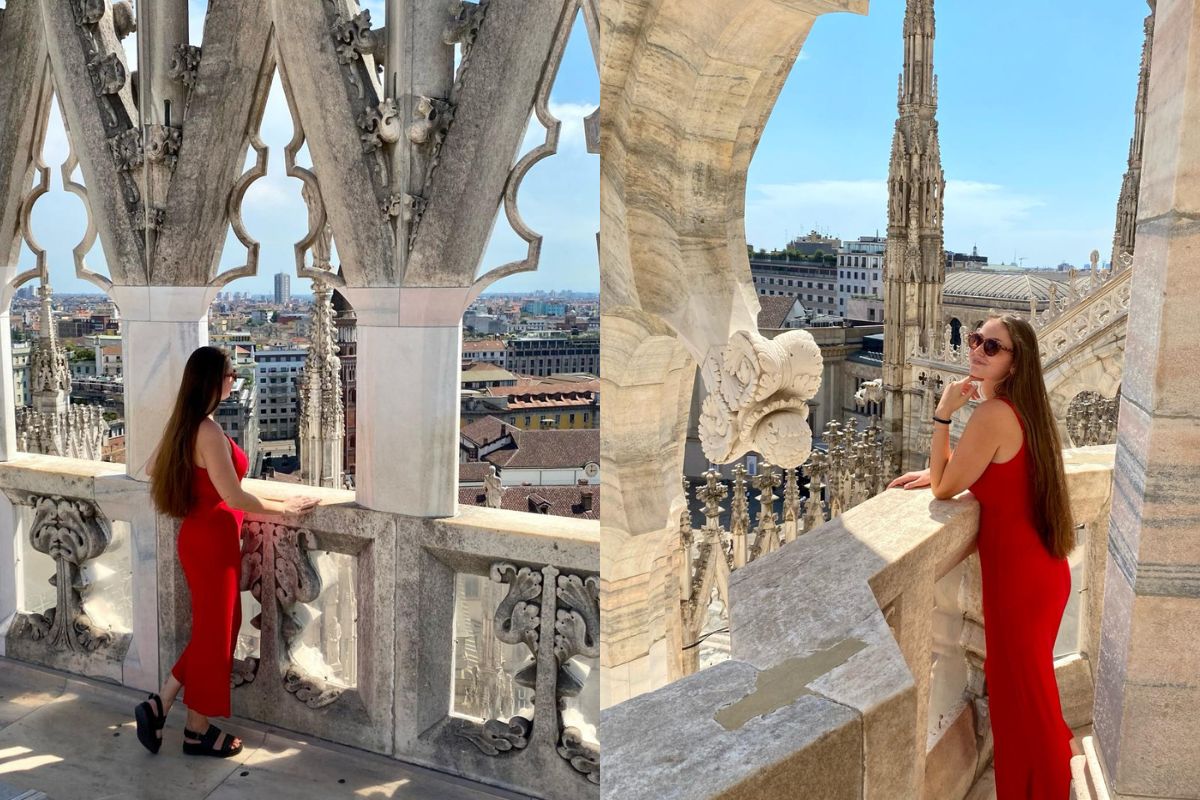
Galleria Vittorio Emanuele II.
Right next to the cathedral, you’ll find the Galleria Vittorio Emanuele II shopping arcade. The Galleria is not only a shopping center but also a historical and cultural symbol of Milan.
It was designed by architect Giuseppe Mengoni and opened in 1867. It is named after the Italian king Vittorio Emanuele II. . The architecture of the gallery combines elements of Renaissance, Baroque, and Neo-Renaissance. The glass dome in the center of the gallery is one of the largest glass ceilings in the world.
On the floor of the gallery are beautiful mosaics representing four main Italian cities — Milan, Turin, Florence, and Rome.
The Galleria is known for its luxury shops, boutiques, and cafes. Here you’ll find brands like Prada, Gucci, Louis Vuitton, and more. In addition to shopping, you can also enjoy cultural experiences in the cafes and restaurants within the Galleria Vittorio Emanuele II. Some of them have been in operation for decades.
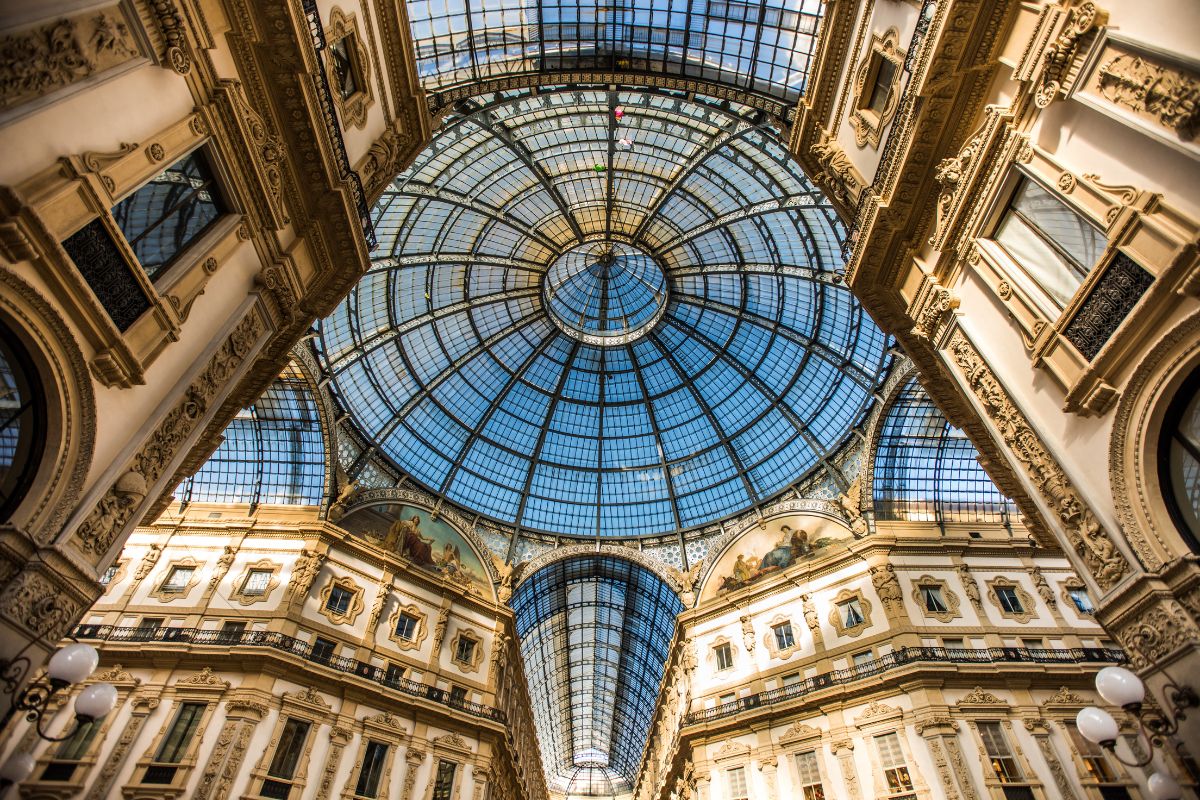
La Scala
La Scala, officially known as Teatro alla Scala, is one of the most prestigious opera houses in the world. La Scala is known for its diverse repertoire, including opera, ballet, and concert productions.
In front of La Scala is Piazza della Scala, where a monument to Leonardo da Vinci stands.
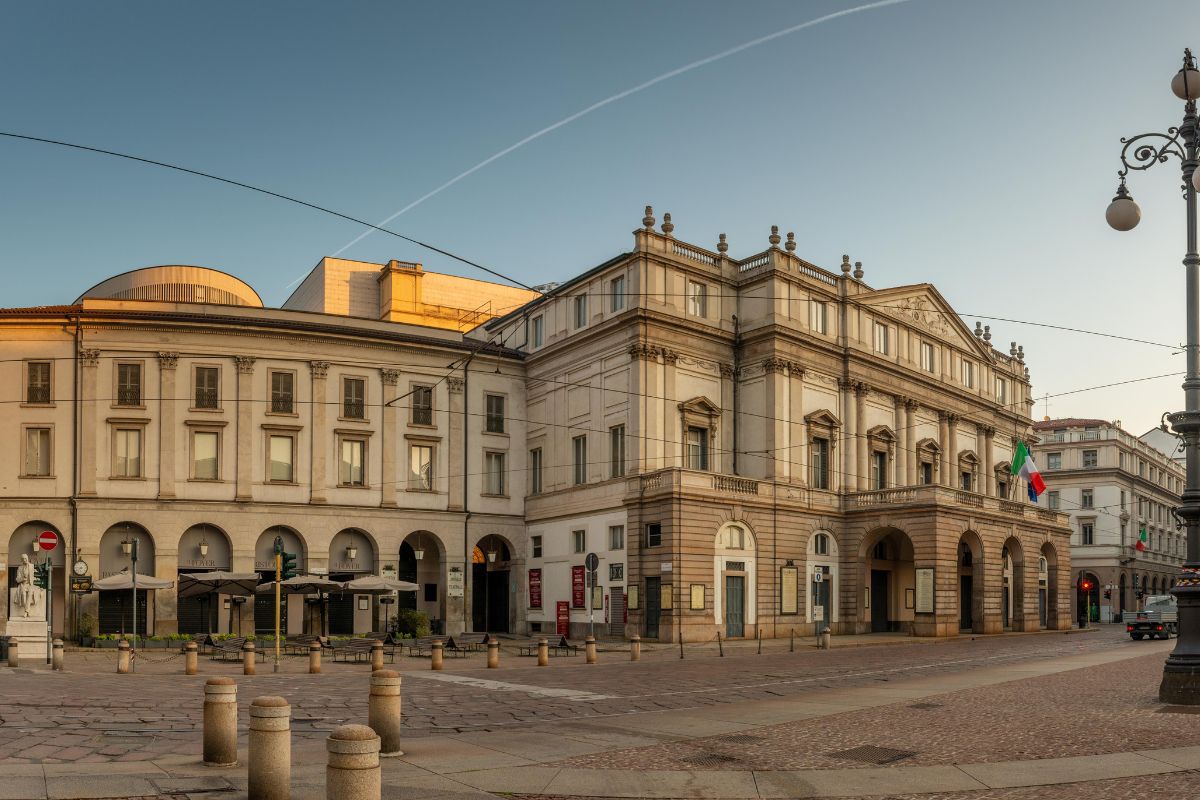
Castello Sforzesco
Castello Sforzesco is an impressive castle in the center of Milan. The castle was originally built in the 14th century by order of the Visconti family, but was later expanded by the Sforza family. The castle’s architecture combines elements of Gothic and Renaissance styles. The castle courtyard is surrounded by towers, and its impressive entrance gate bears the coats of arms of the Sforza family.
Inside the castle, you’ll find several museums that showcase Milan’s rich history and artistic heritage.
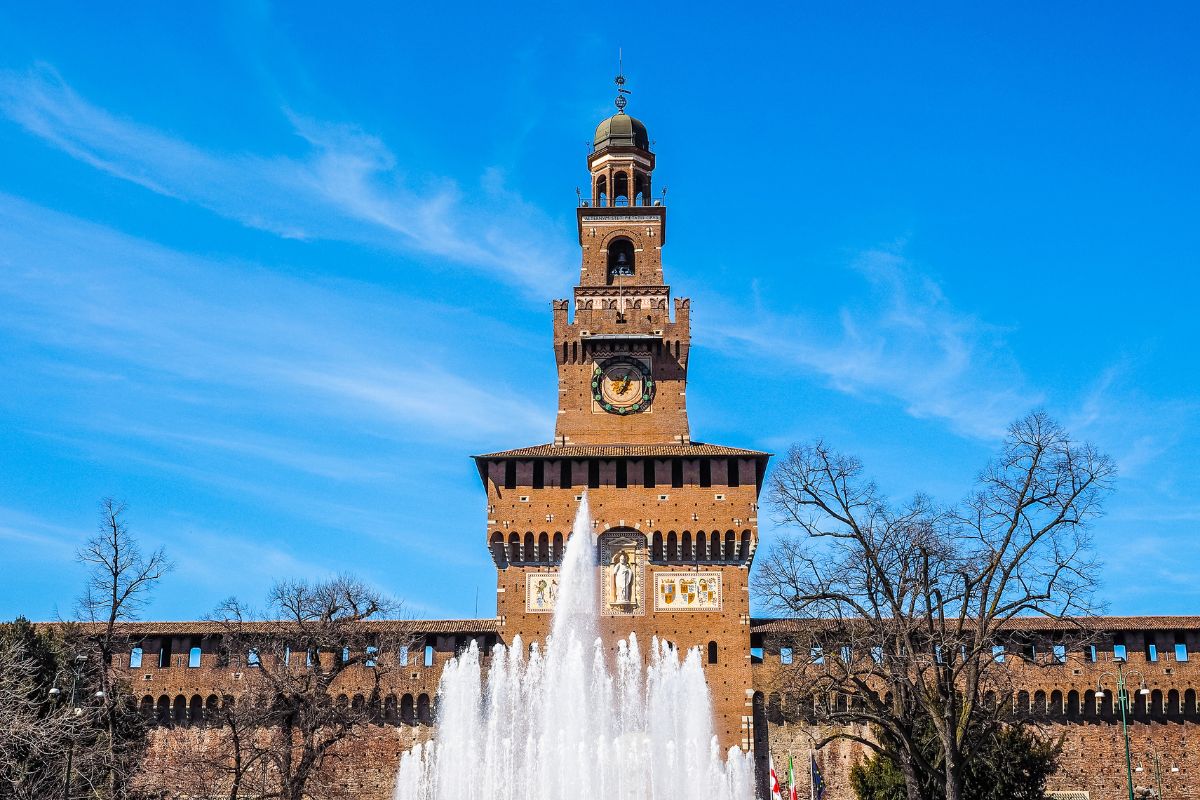
Parco Sempione
Right behind Castello Sforzesco, you’ll find Parco Sempione, a public park. It covers over 38 hectares and is full of gardens, avenues, and flowers. At the end of the park stands an impressive triumphal arch known as Arco della Pace (Arch of Peace).
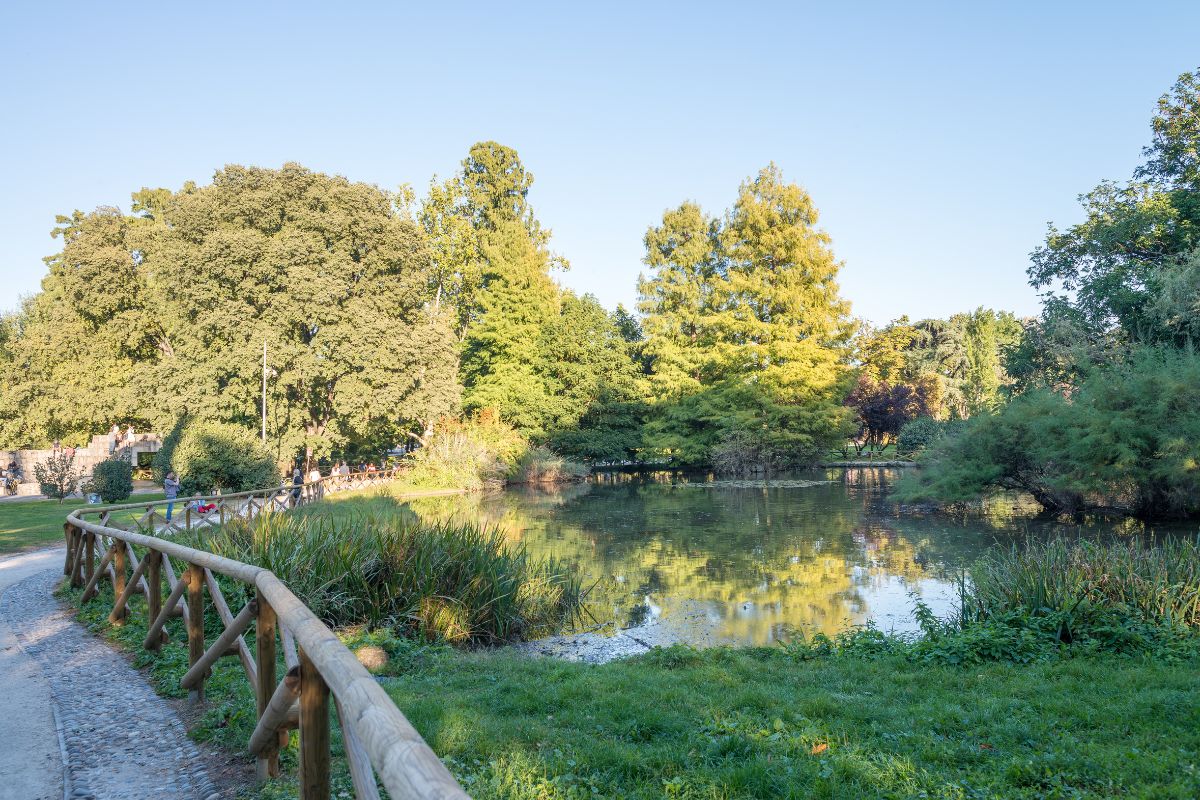
Arco Della Pace
The Arco della Pace arch was built by order of Napoleon Bonaparte in 1807 as a symbol of peace after Napoleon’s victories. The arch’s architecture combines elements of Classicism and Neoclassicism. It is adorned with rich reliefs and sculptures, including military scenes and allegories of peace.
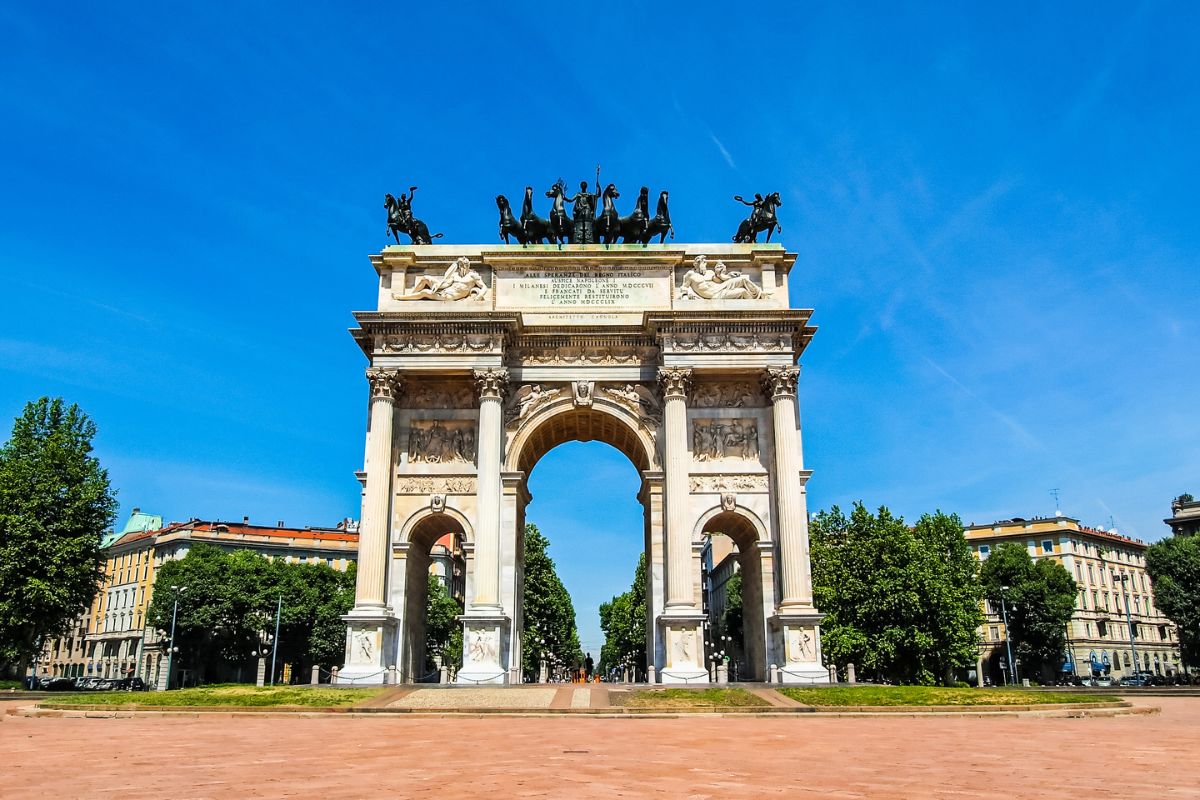
Santa Maria Delle Grazie
The Church of Santa Maria delle Grazie is located in the center of Milan, not far from Castello Sforzesco. The church was built in the 15th century in Renaissance style.
Santa Maria delle Grazie is primarily known for Leonardo da Vinci’s fresco The Last Supper, which adorns the wall of the monastery’s refectory. This fresco is considered one of the most significant works of art in history.
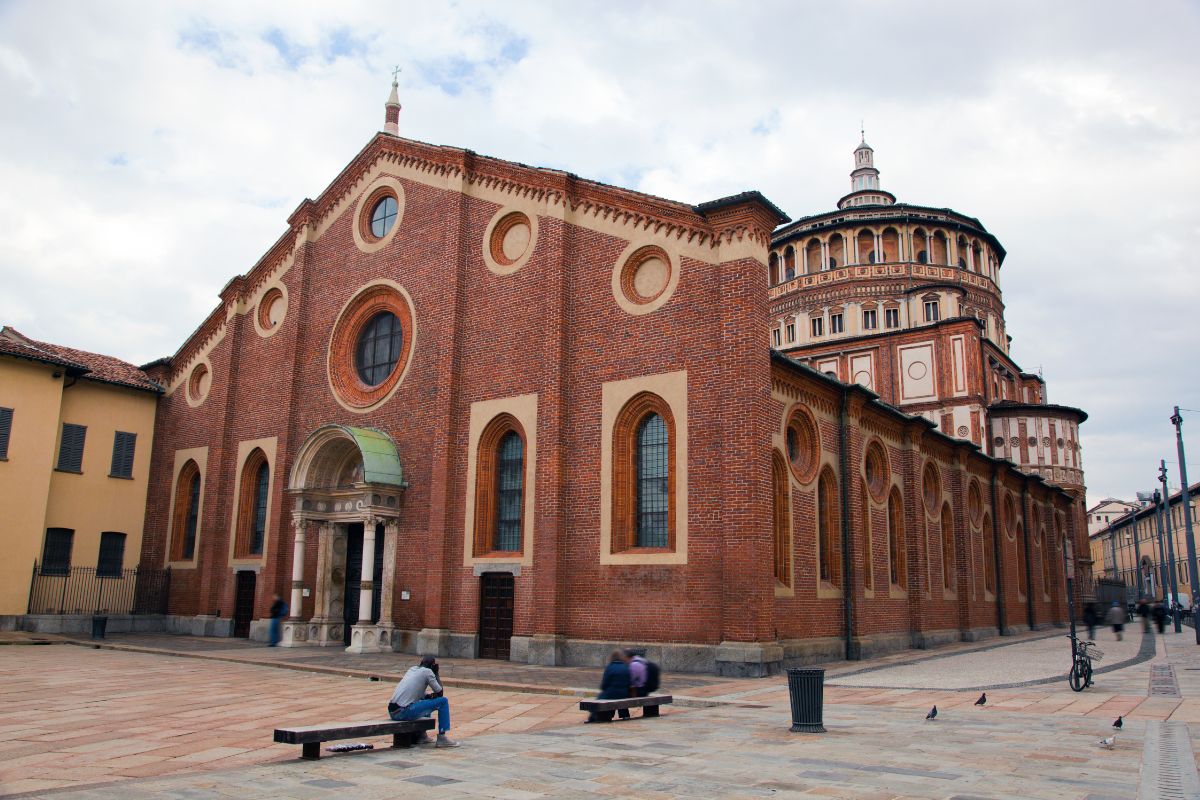
Torre Velasca
You can also find the Torre Velasca tower in the center of Milan. It was built in the 1950s and is considered a significant work of modern Italian architecture. Torre Velasca has a characteristic shape that resembles medieval Italian towers.
Originally, Torre Velasca was designed as an office building, but today it also serves as a residential complex. Some parts of the building are open to the public.
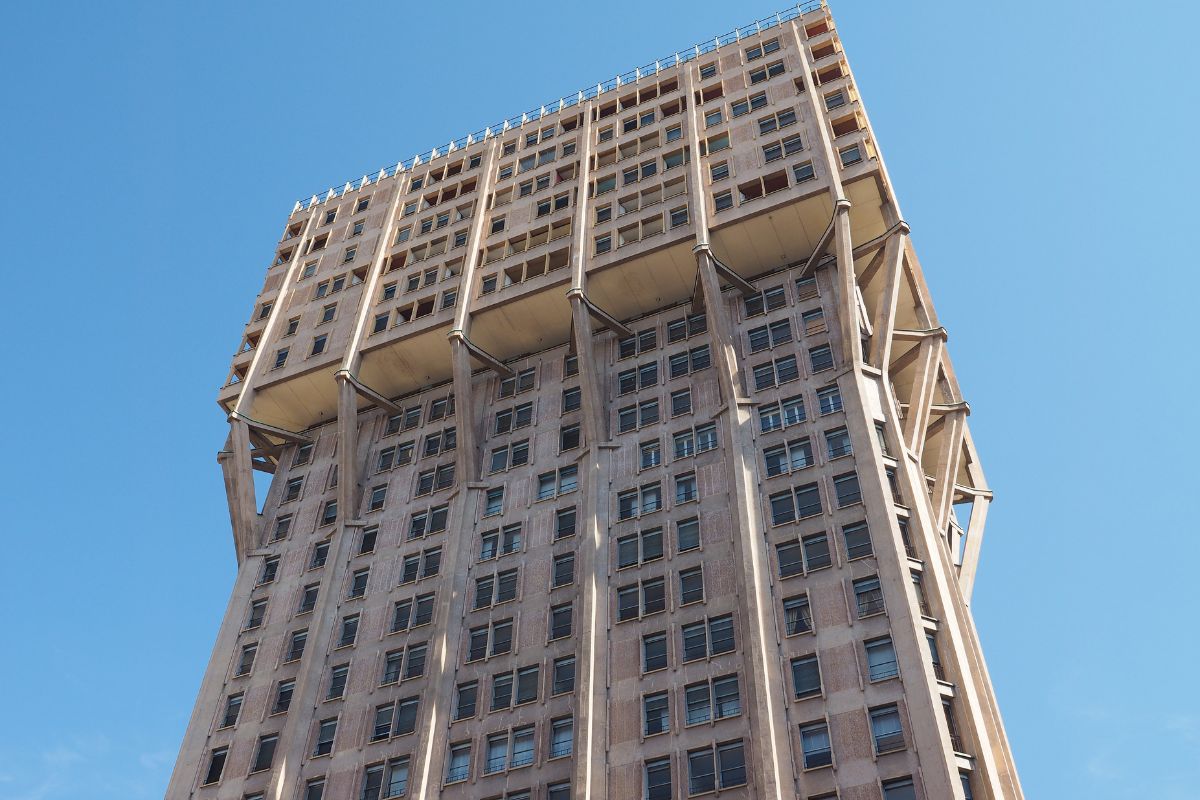
Gallerie D’Italia
In the center of Milan, you’ll find the Gallerie d’Italia art gallery, which offers a rich collection of Italian art from the 19th century to the present day. So, if you’re an art enthusiast, don’t miss it from your list.
Basilica Di Sant’Ambrogio
The Basilica of Saint Ambrose is one of the oldest Christian churches in Milan. The church was built in the 4th century on the site of an original Christian temple. The basilica combines elements of Romanesque and Lombard architecture. Its facade is adorned with distinctive columns and mosaics, which are typical for Romanesque churches in Italy.
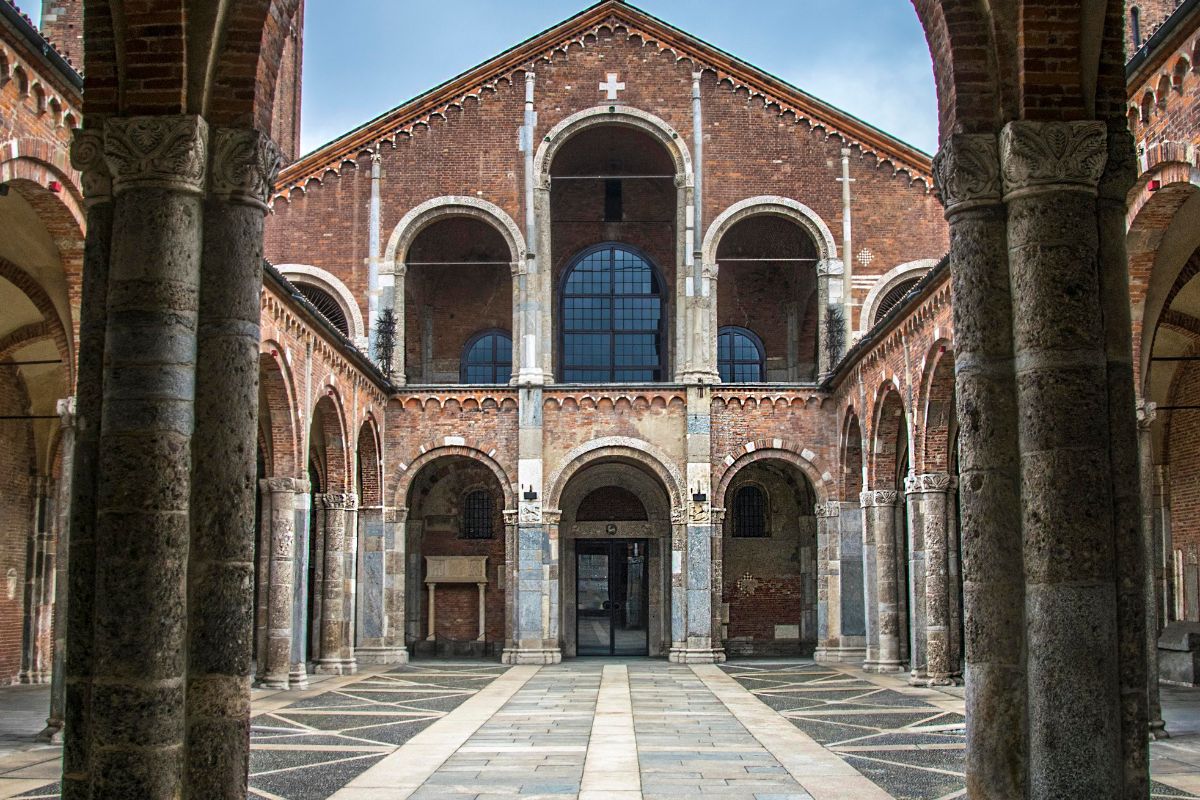
Pinacoteca Di Brera
Pinacoteca di Brera is an art gallery in Milan, located in the historic Brera district. The main entrance to the gallery is on Via Brera.
Pinacoteca di Brera hosts a significant collection of Italian art from the Middle Ages to the 20th century. It includes works by famous artists such as Raphael, Caravaggio, Piero della Francesca, and many others.
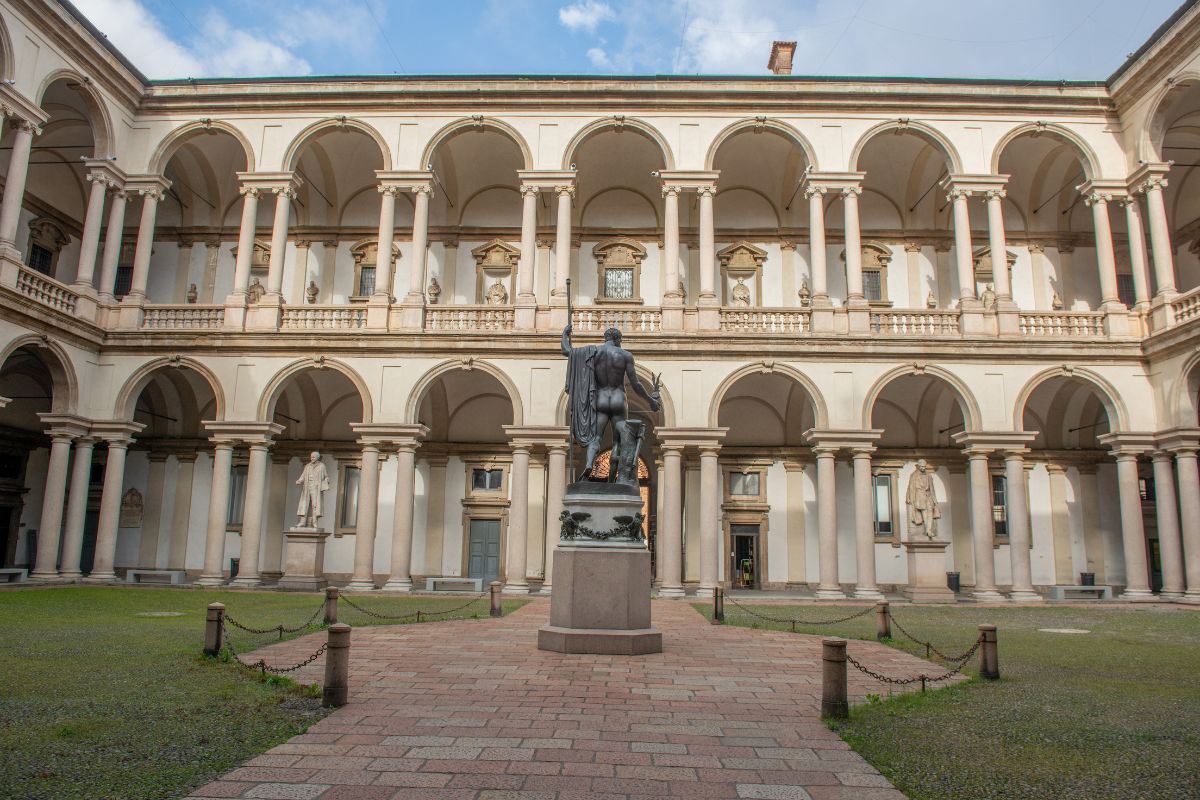
Royal Palace (Palazzo Reale)
Another prominent landmark in the city center is the Royal Palace, which originally served as the residence of Milan’s rulers, especially the Visconti family and later the Sforza family. Today, it is used for cultural and artistic events.
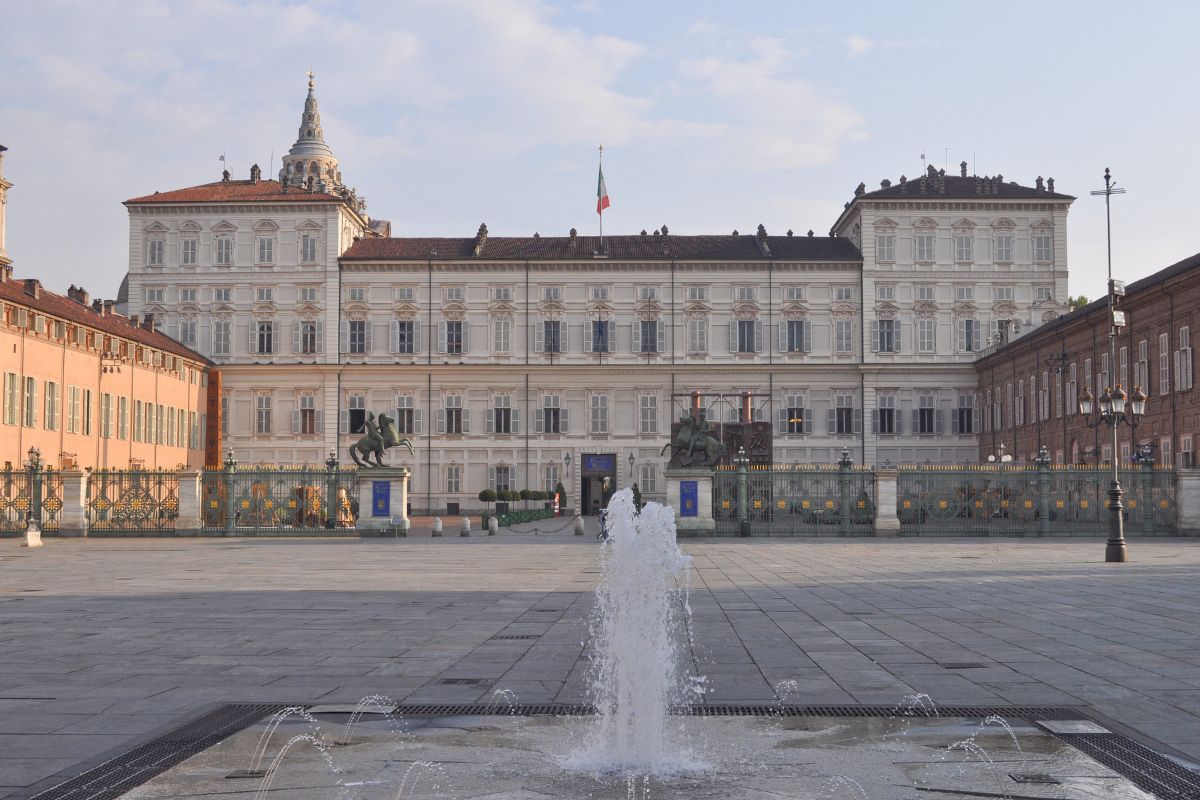
San Siro
San Siro Stadium is located in the northwestern part of Milan. It stands on the square of the same name, Piazzale Angelo Moratti, and is the home stadium of two famous football clubs – AC Milan and FC Internazionale.
San Siro has a capacity for over 75,000 spectators and is one of the most famous football stadiums in the world. However, San Siro doesn’t only host football matches. It is also a venue for concerts and other cultural events.
Bosco Verticale
Bosco Verticale is the name for a high-rise building with modern apartments. What’s interesting about this building is that it’s surrounded by greenery. Plants, including trees, shrubs, and flowers, are placed on every balcony.
Architect Stefano Boeri Architetti is behind this green and ecological project. Apartments in Bosco Verticale are considered prestigious properties and an architectural masterpiece. The project has received several awards for its innovation and design.
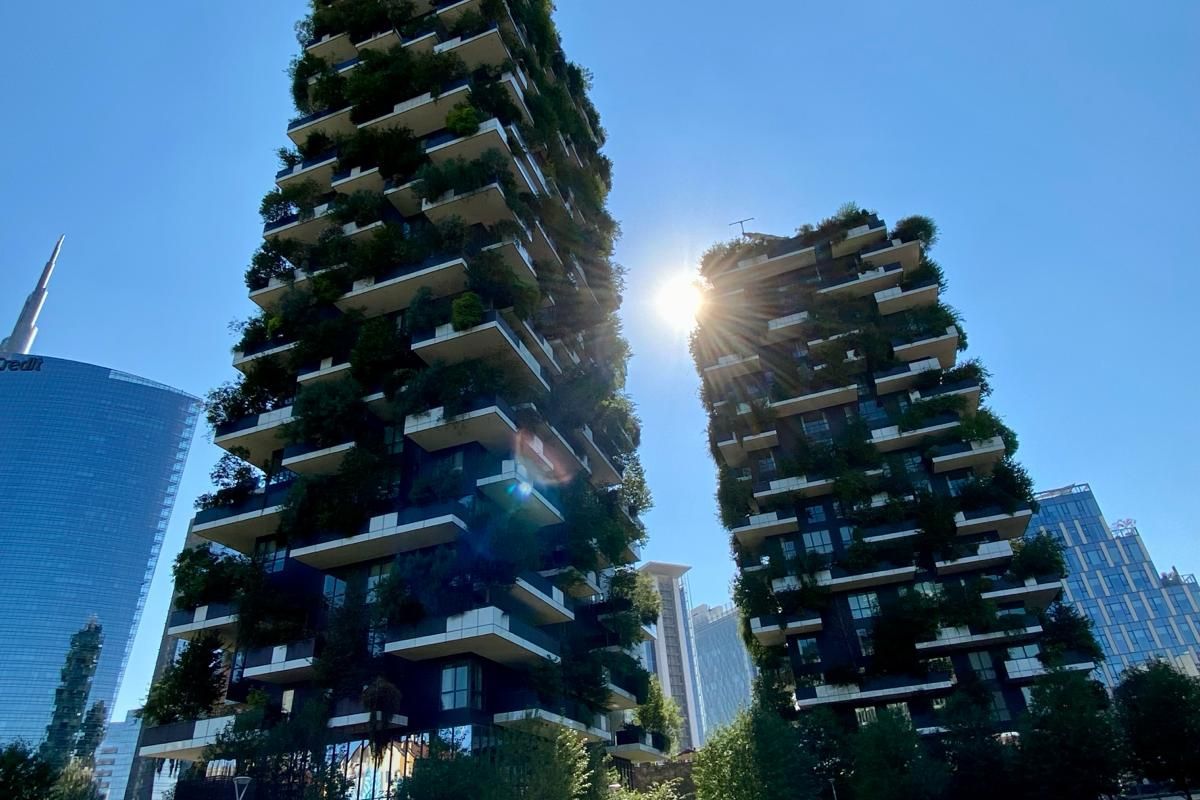
San Maurizio Al Monastero Maggiore
The Church of San Maurizio al Monastero Maggiore was built in the 16th century and is connected to a Benedictine monastery. The church’s architecture combines elements of Renaissance and Lombard Gothic styles. The church is primarily known for its magnificent frescoes and paintings.
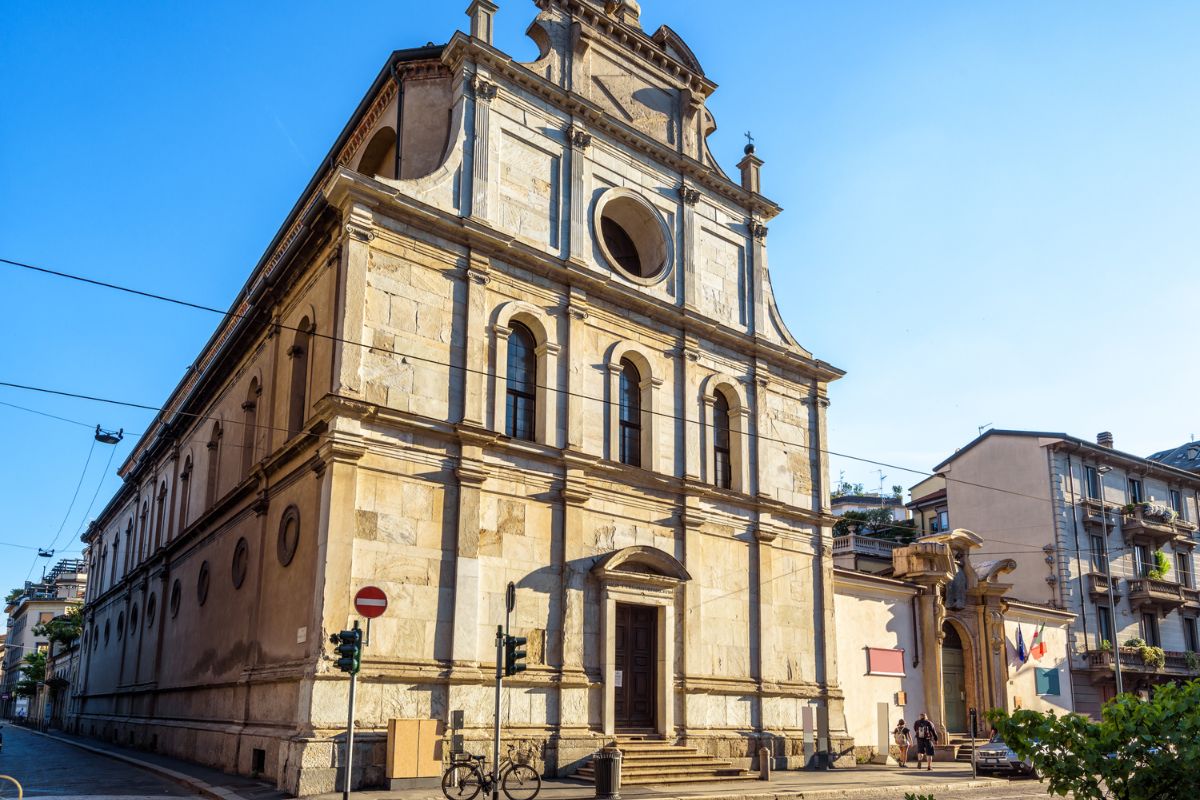
Giardini Indro Montanelli
Giardini Indro Montanelli is a public park located in the city center near Porta Venezia. It was founded in the 18th century and is named after the Italian journalist and politician Indro Montanelli.
Rotonda Della Besana
Rotonda della Besana is a small square that offers visitors a combination of history, architecture, and relaxation. The buildings in the square feature Neoclassical architecture. The Rotonda itself consists of a central structure with colonnades and is surrounded by an open space.
Beautiful gardens and small parks surround Rotonda della Besana. Exhibitions, cultural events, and public gatherings are regularly held in the area.
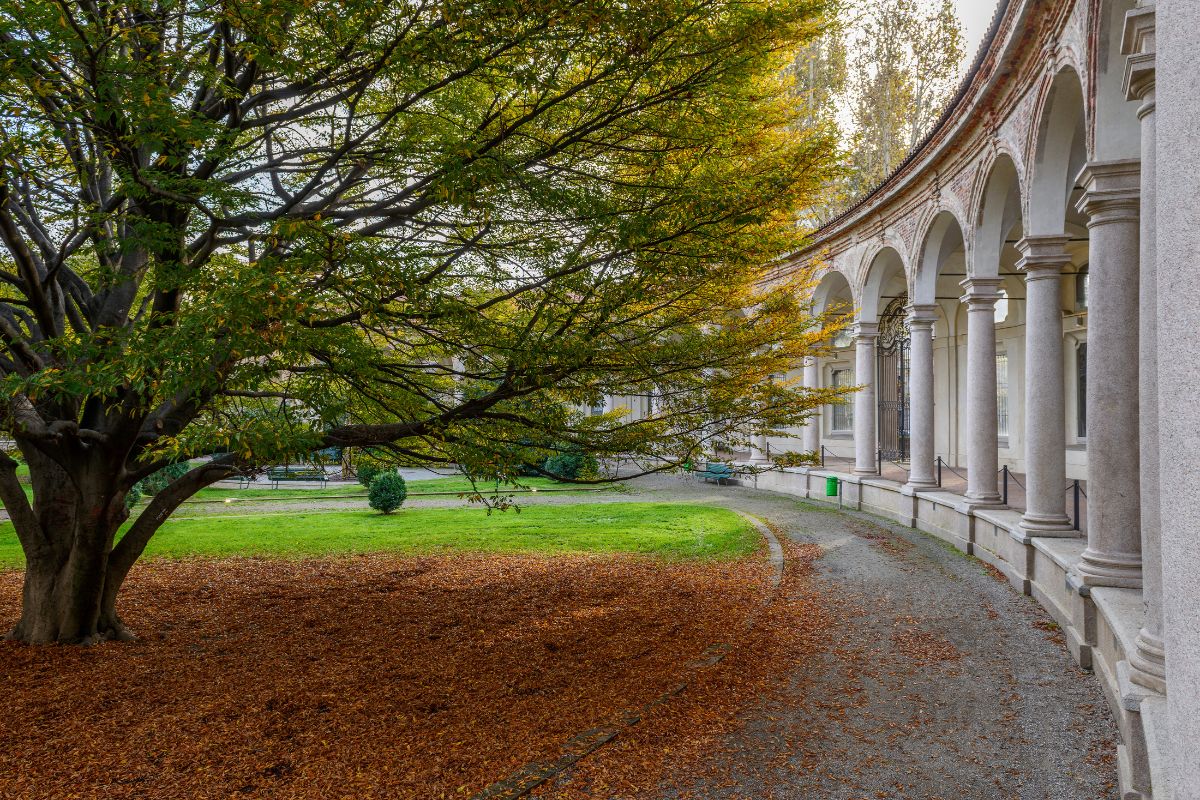
Piazza Gae Aulenti
Piazza Gae Aulenti is a modern square located in the newer part of Milan, in the Porta Nuova area. The square is surrounded by tall office buildings and commercial complexes.
Thanks to its location, Piazza Gae Aulenti offers impressive views of modern Milan’s city center.
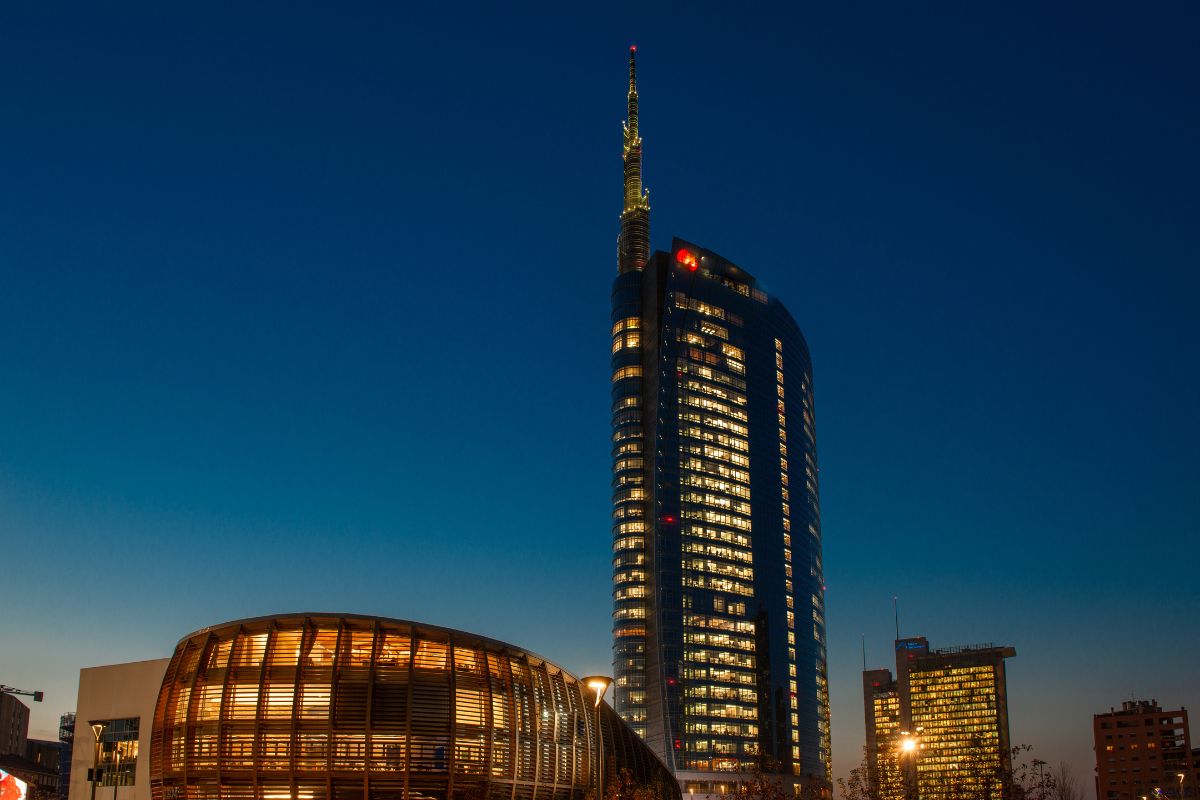
Cimitero Monumentale
Cimitero Monumentale, or the Monumental Cemetery, is located in the northwestern part of Milan. It is one of the largest cemeteries in Italy. The cemetery was opened in 1866 and has since served as the final resting place for many prominent figures in art, culture, politics, and science.
Basilica San Lorenzo
Basilica San Lorenzo is located in the center of Milan, not far from the university and the botanical garden. The basilica is known for its impressive architecture, including a Romanesque facade and an attractive Gothic interior.
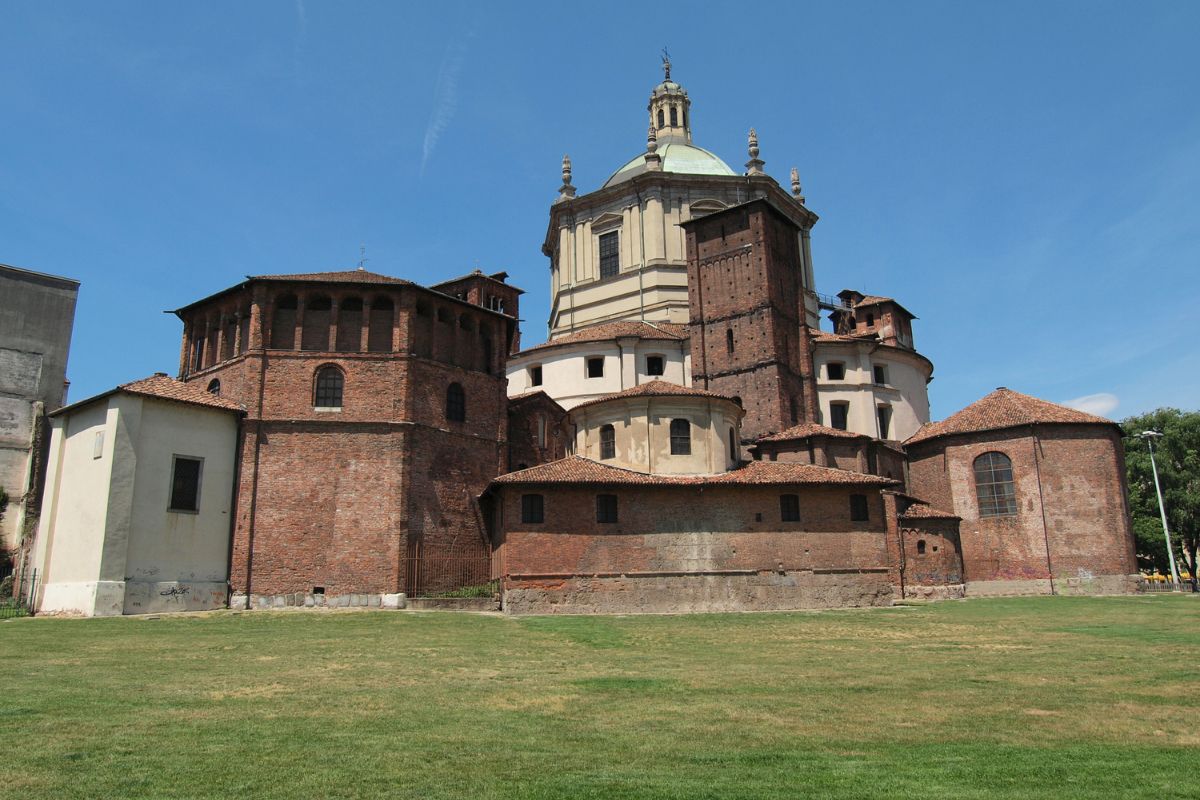
Museo Del Novecento
Museo del Novecento is located in the center of Milan, right on Piazza del Duomo. In addition to its permanent collections, the museum regularly hosts temporary exhibitions, which also include works by contemporary artists.
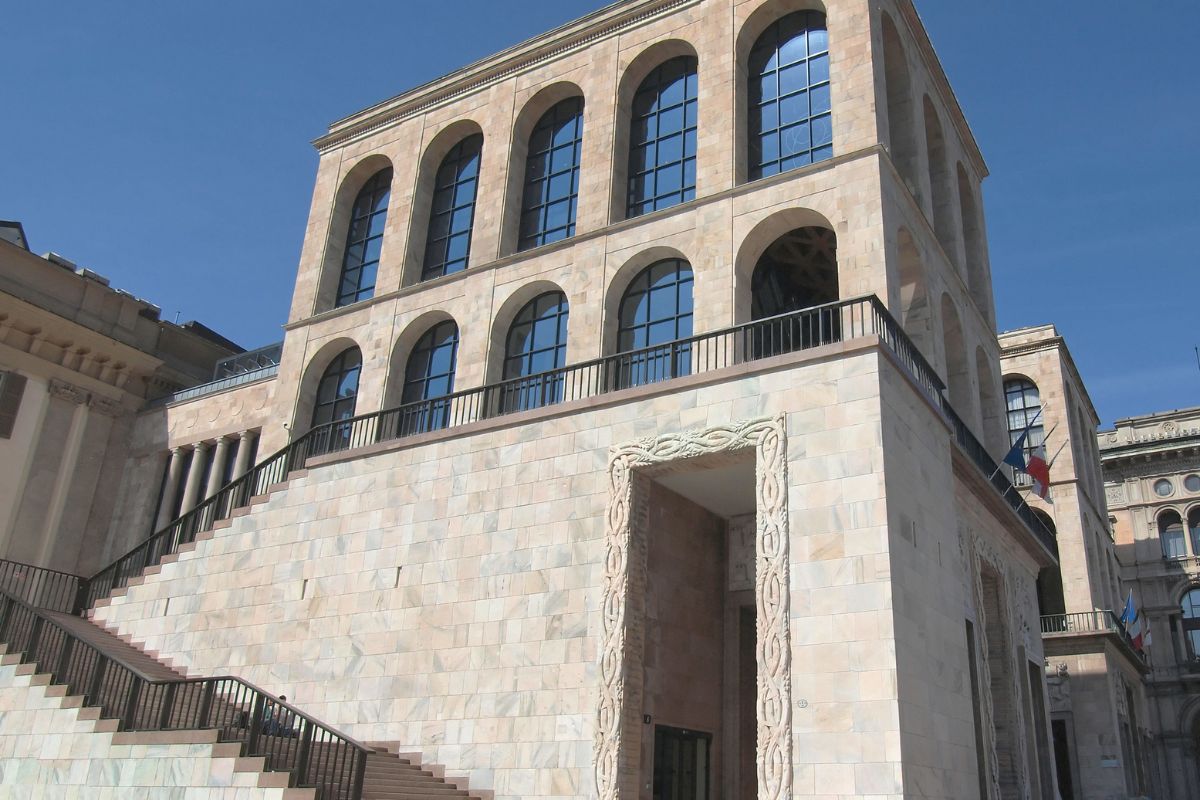
Santuario Di San Bernardino Alle Ossa
The Sanctuary of San Bernardino alle Ossa is known for its Baroque architecture and decoration. It was built on the site of an original chapel dedicated to Saint Bernardino of Siena in the 13th century.
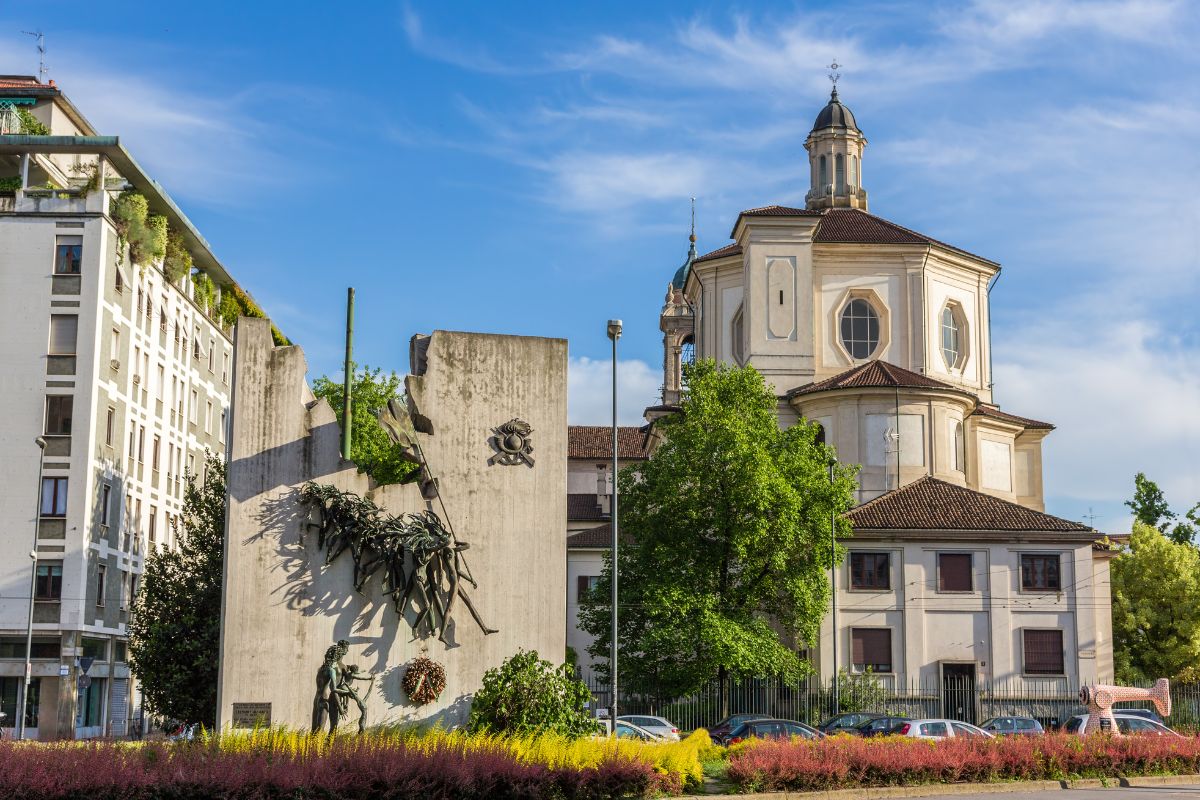
Piazza Mercanti
Piazza Mercanti is located in the historic part of Milan. Piazza Mercanti is surrounded by historic buildings with Renaissance architecture. Key buildings include Palazzo della Ragione and Loggia degli Osii.
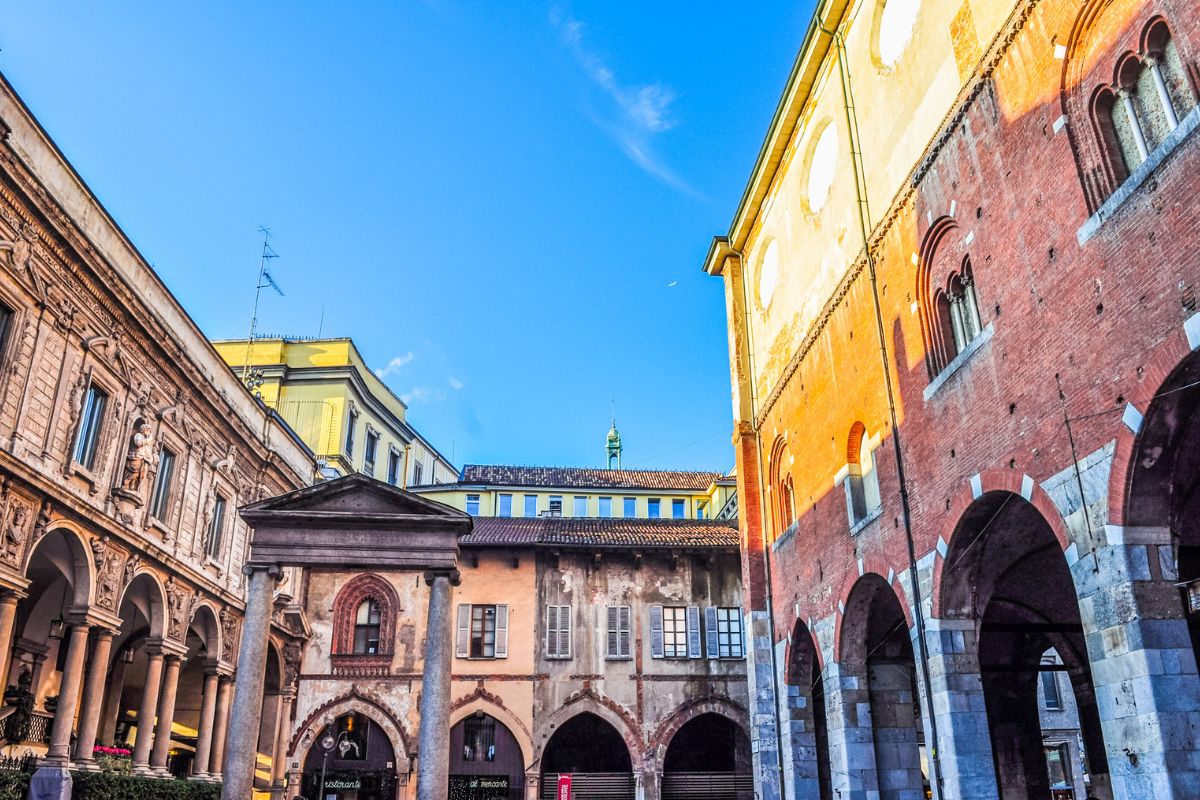
Europark Idroscalo Milano Amusement Park
If you are a fan of attractions and adrenaline or are wondering what to do with children in Milan, then visit Europark Idroscalo Milano amusement park. The park features various attractions, including roller coasters, carousels, and other adrenaline activities.
Porta Ticinese
Porta Ticinese is a historic gate dating from the 16th century. It is located at the end of Corso di Porta Ticinese.
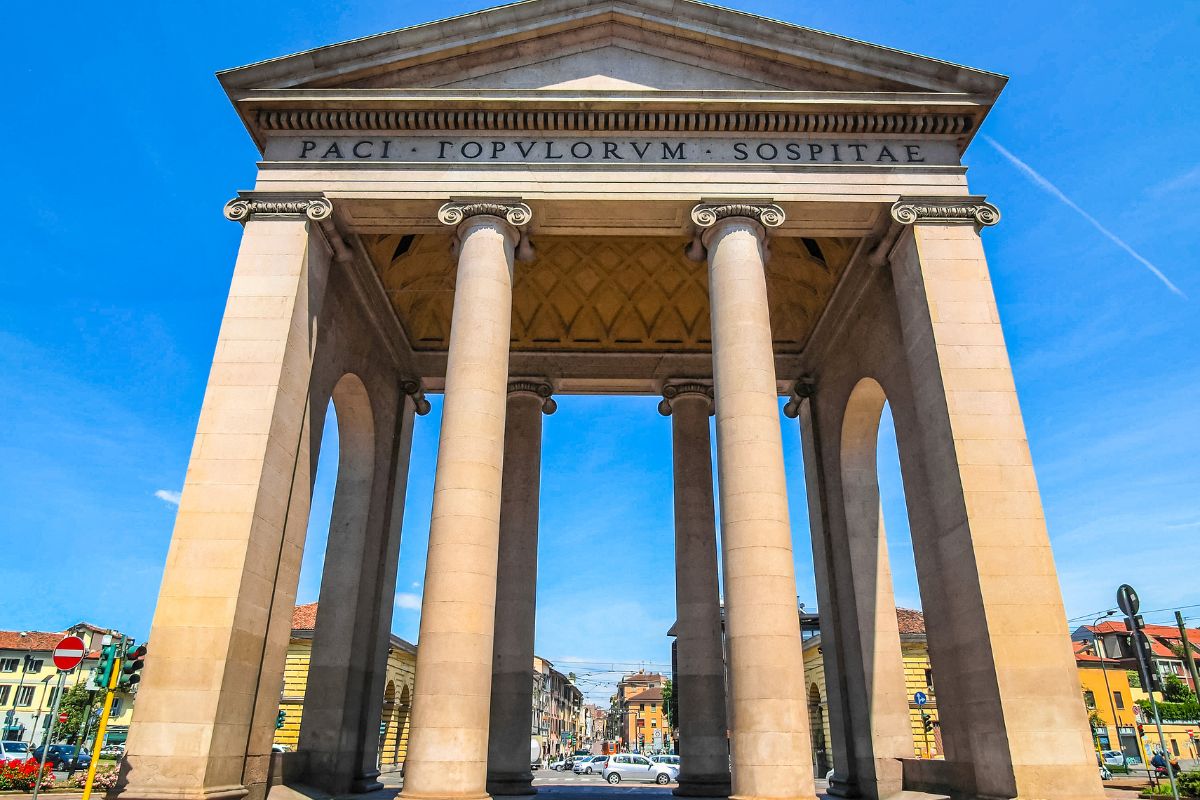
Historic Naviglio Grande Canal
Take a stroll along the historic Naviglio Grande canal. It was built in the 12th century and originally served to improve navigation and transport goods to and from Milan. The canal flows through the southwestern part of the city and connects Duomo Square (Piazza del Duomo) with the Navigli area.
The area around the canal is full of stylish restaurants, cafes, and boutiques. Most of the restaurants offer an all-you-can-eat buffet for the price of one drink (usually around 10-15 euros).
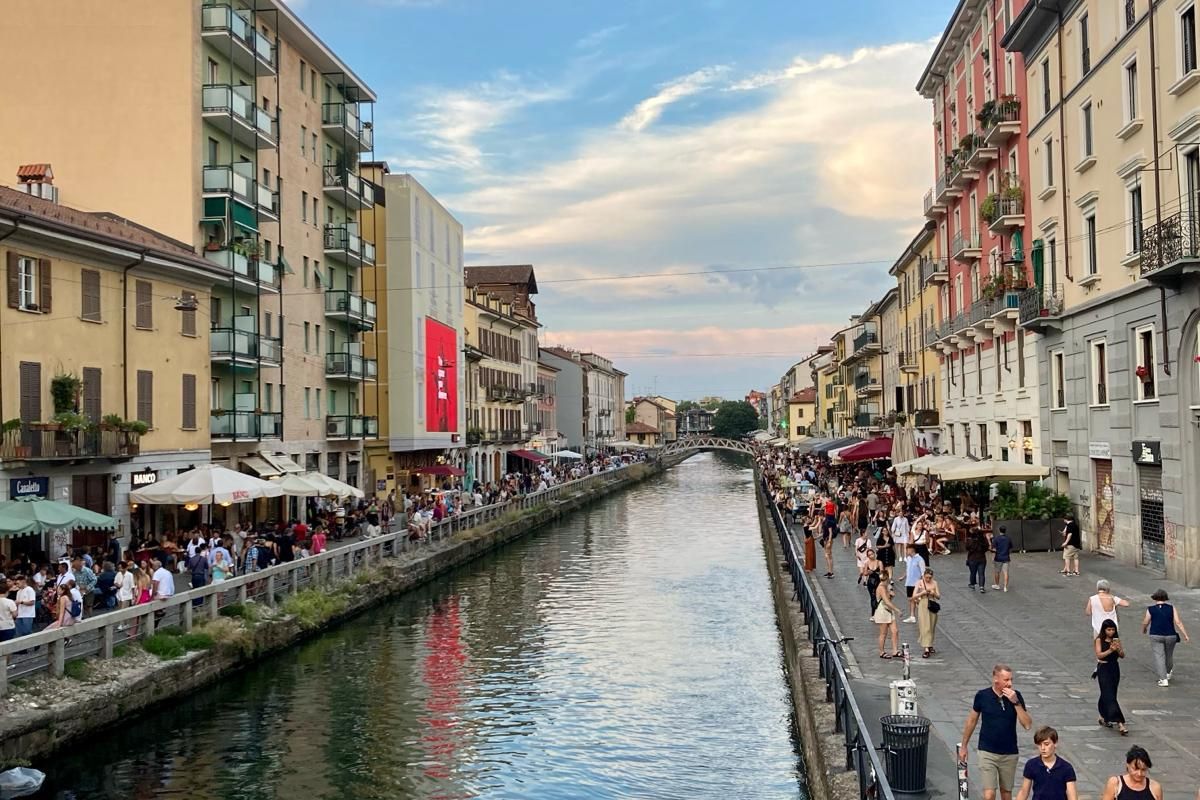
Leonardo Da Vinci’s Vineyard
During your visit to Milan, you must not forget a hidden gem called Leonardo da Vinci’s Vineyard. While this world-renowned artist was working on his painting The Last Supper, he used to rest right here.
Where to Shop in the City of Fashion
What else should you do in the city of fashion and commerce but shop! You can head to the luxury shops in Quadrilatero d’Oro or, if your wallet is a bit lighter, like mine, then go shopping on the most famous street, Corso Vittorio Emanuele II.
Don’t Miss Fashion Week
Milan is clearly associated with the prestigious event called Fashion Week, during which the latest collections from leading Italian designers and fashion houses are presented.
It usually takes place twice a year, in September or February.
Enjoy an Aperitivo at Local Establishments
In Italy, we must act like Italians, so in the evening, head to a nice establishment for a traditional aperitivo.
Aperitivo is a popular custom in Italian culture, which involves light drinks and small snacks served before the main meal. It’s a social occasion where people gather, chat, and enjoy moments before dinner.
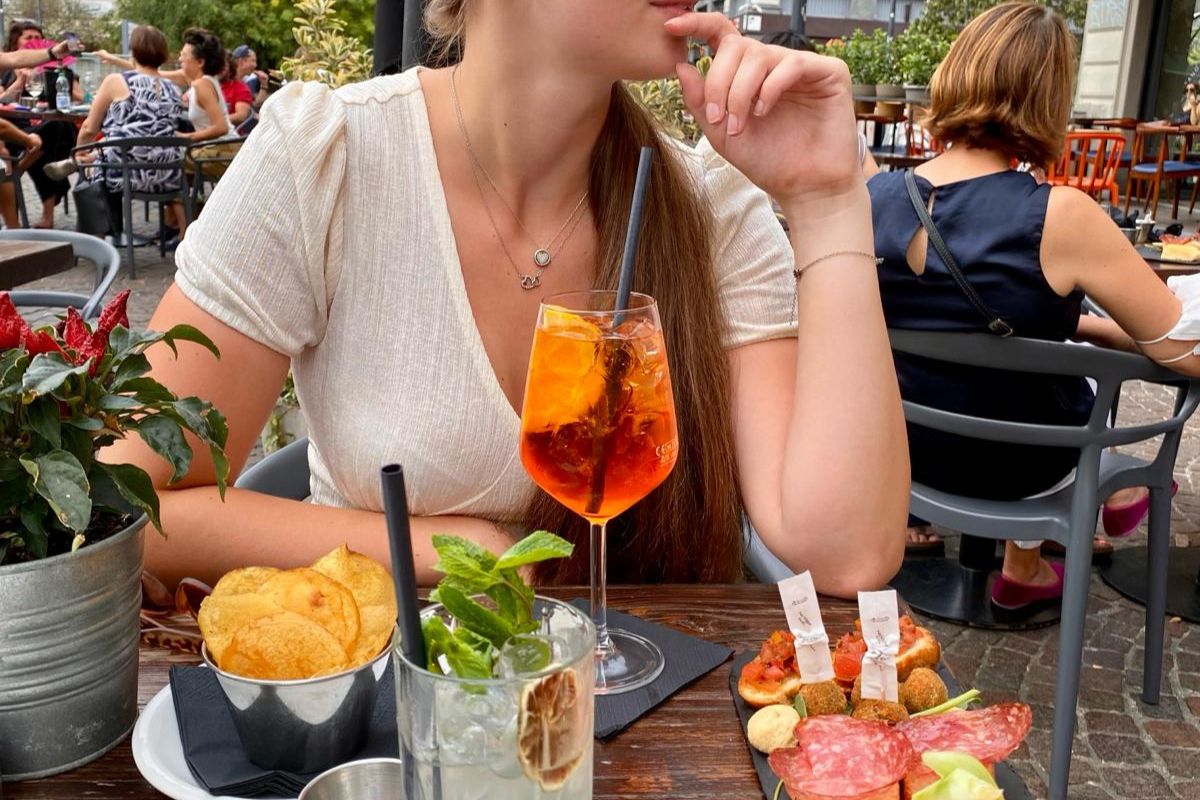
Excursions in the Surroundings
As the capital of Lombardy, Milan is a transport hub, and you can truly get anywhere from here. So if you’ve had enough of the fashion city, take a trip around the area.
I consider trains the best way to travel around Italy; you can easily find all connections on Trenitalia.com.
TIP: You can purchase organized tours on the travel portal GetYourGuide.
Lake Como
The best thing about Milan is that you can escape the hot city with a short train ride to Lake Como. You can go to the lake for a day trip or even spend several days there. The lake is beautiful and offers plenty of activities and entertainment.
TIP: For all information about Lake Como, read our article. You will find everything you need to know in it.
Varenna
If you only have time for a day trip, I highly recommend the town of Varenna on Lake Como. Varenna is absolutely beautiful and easily accessible by train.
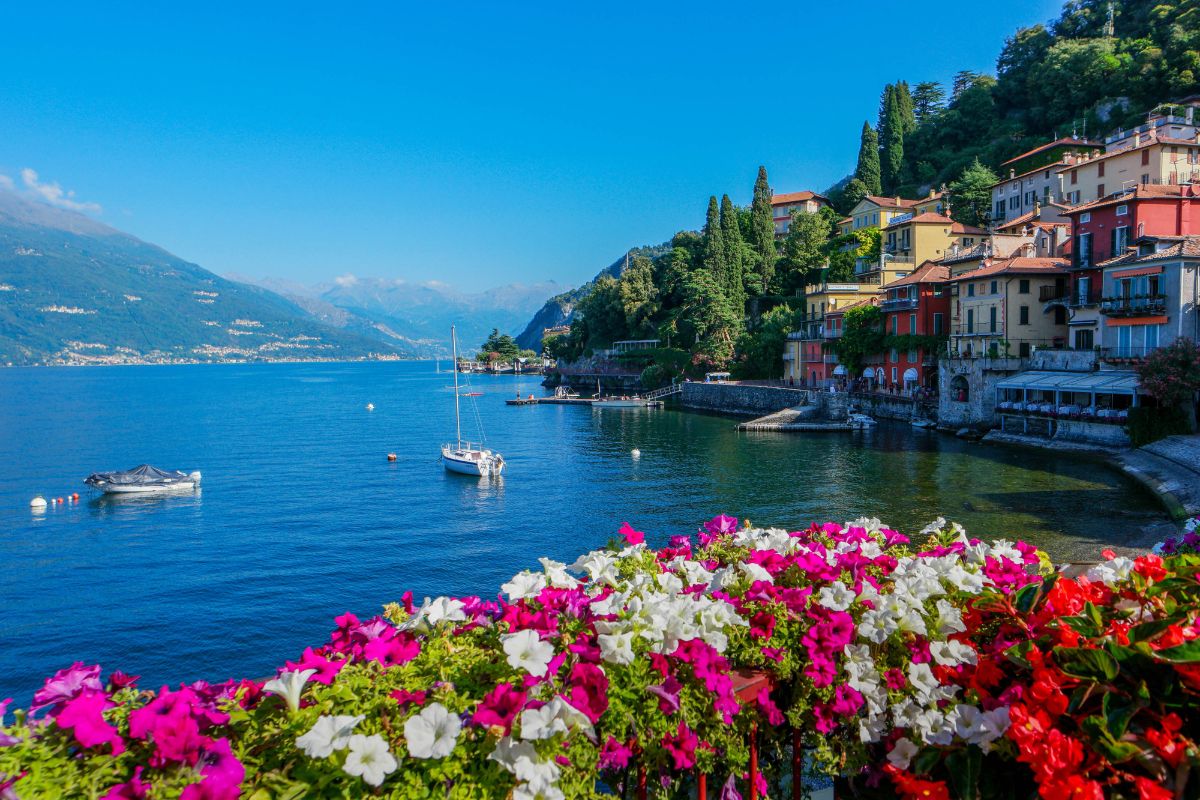
Bergamo
About 40 km from Milan, you’ll come across Bergamo. Bergamo is a picturesque city with a rich history and cultural heritage that attracts all its visitors with its Italian atmosphere.
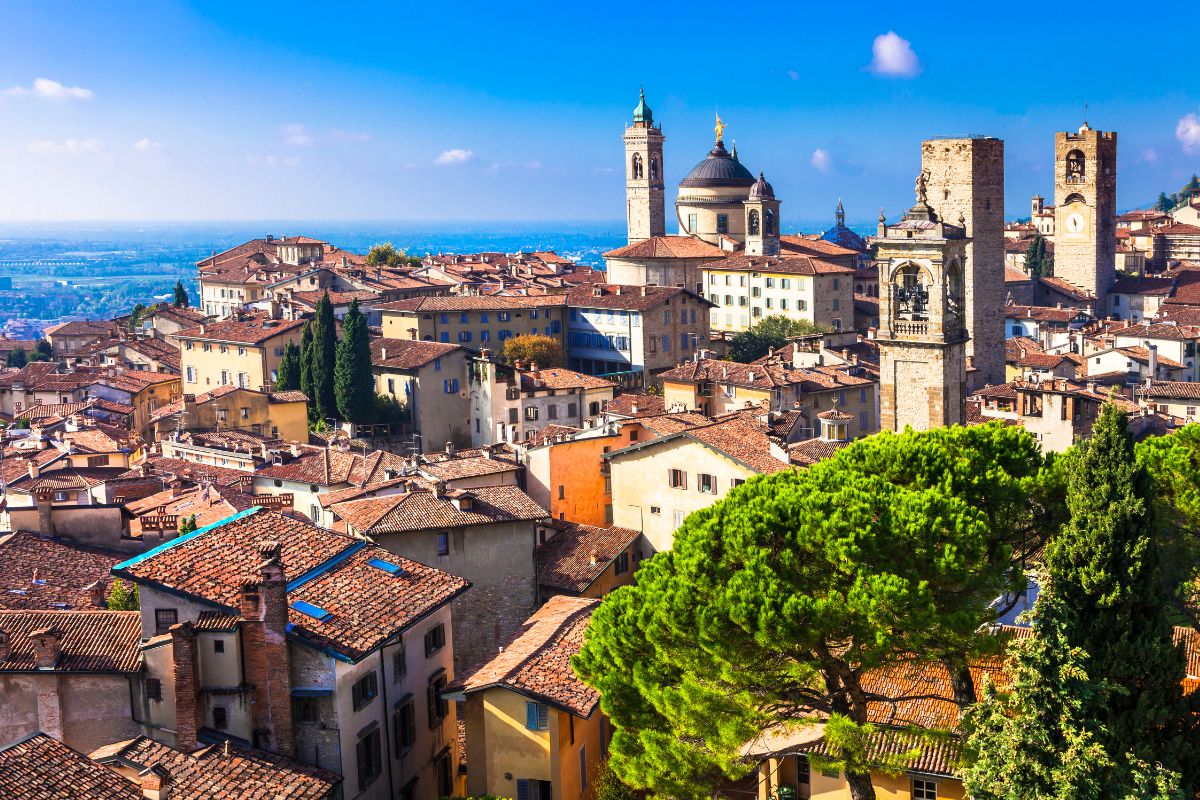
Verona
Verona is a charming city in northern Italy, known for its history and romantic atmosphere. Verona is located in the Veneto region, about 160 kilometers east of Milan. You can reach Verona from Milan by train in under 2 hours.
Venice
Everyone should see Venice at least once in their lifetime. The city is built on more than 100 small islands, connected by bridges and canals. If you take a train from Milan towards Venice, you’ll be there in approximately 2 to 2.5 hours.
TIP: A complete guide to Venice can be found HERE.
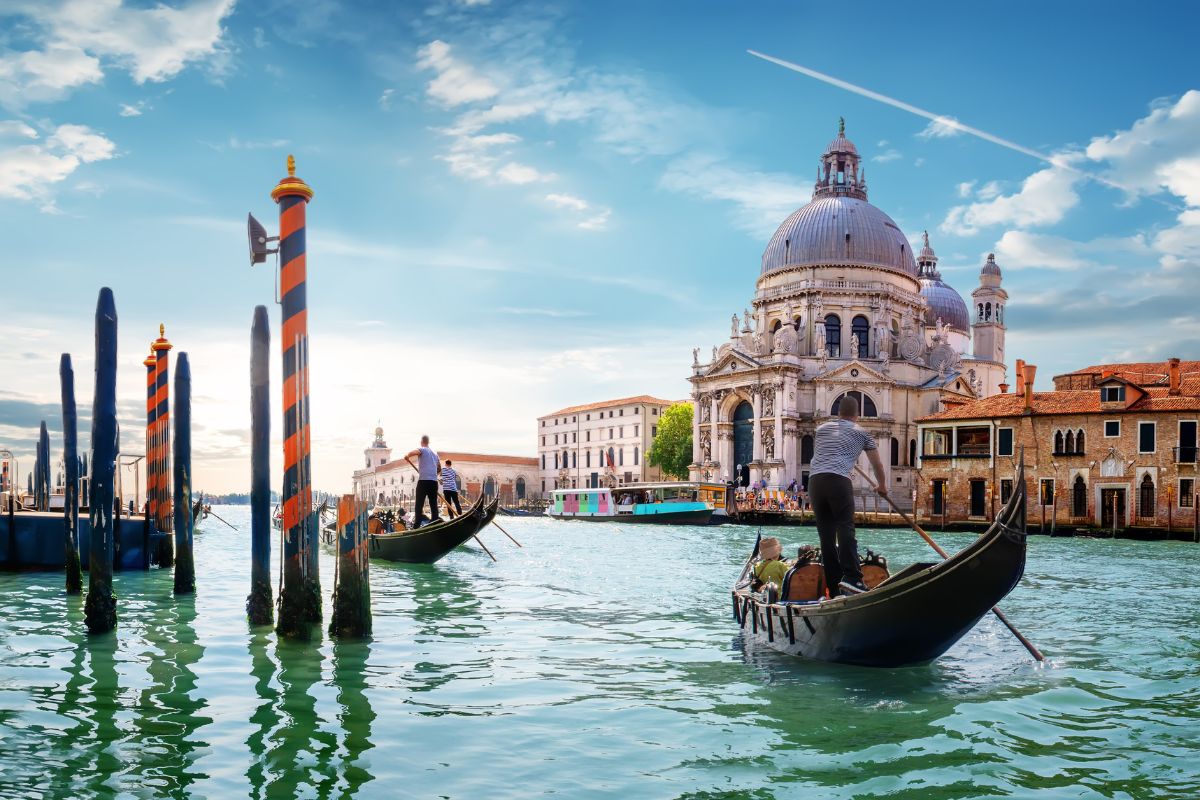
Cinque Terre
Five beautiful, picturesque villages nestled into the cliffs can be found in the national park Cinque Terre. If you have the time and opportunity, you should definitely go there. You can reach Cinque Terre by train from Milan in about 3 hours.
TIP: Read more about Cinque Terre in our article.
Tips for Visiting Milan
Milan is absolutely stunning and definitely worth a visit. I’ve put together a few tips for you:
- Bring comfortable footwear. Milan is huge, and you’ll likely do a lot of walking. There are cobblestones or slippery stone pavements everywhere, and your feet will thank you.
- Most sights are located in the city center, which you can easily walk around. For more distant places, use the metro or the historic yellow trams.
- If you get up early for important tourist spots, you’ll likely enjoy them without crowds.
- Explore Milan even after dark; the landmarks are beautifully lit.
- You’ll find many fountains with cold drinking water around the city, so you don’t have to spend money on bottled water. Just bring an empty bottle.
- Try local dishes, but opt for more secluded establishments. This way, you’ll not only save money but also likely find restaurants where locals go, not just tourists.
- Don’t be afraid to buy cheaper admission (via stairs) to the Duomo rooftop terraces; the climb up is not difficult at all.

Frequently Asked Questions:
When is the best time to visit Milan?
Milan is pleasant most of the year, but the best times are usually spring and autumn when the weather is mild. In summer, it can be very hot, and in winter, it can be cold.
How do I get from the airport to Milan city center?
From Malpensa Airport, you can use the express train or bus. From Linate and Orio al Serio airports, we recommend transport by bus or taxi.
How to get around the city?
Milan has a well-functioning metro, tram, and bus system.
How many days should I dedicate to visiting Milan?
For a basic city tour, we recommend at least 2 to 3 days. This will give you time to explore the main sights and the surrounding area.
When is Milan Fashion Week?
Milan Fashion Week takes place twice a year, usually in February and September.
What to do with kids in Milan?
Visit Europark Idroscalo Milano amusement park.
Tips and Tricks for Your Vacation
Don’t Overpay for Flights
Search for flights on Kayak. It’s our favorite search engine because it scans the websites of all airlines and always finds the cheapest connection.
Book Your Accommodation Smartly
The best experiences we’ve had when looking for accommodation (from Alaska to Morocco) are with Booking.com, where hotels, apartments, and entire houses are usually the cheapest and most widely available.
Don’t Forget Travel Insurance
Good travel insurance will protect you against illness, accidents, theft, or flight cancellations. We’ve had a few hospital visits abroad, so we know how important it is to have proper insurance arranged.
Where we insure ourselves: SafetyWing (best for everyone) and TrueTraveller (for extra-long trips).
Why don’t we recommend any Czech insurance company? Because they have too many restrictions. They set limits on the number of days abroad, travel insurance via a credit card often requires you to pay medical expenses only with that card, and they frequently limit the number of returns to the Czech Republic.
Find the Best Experiences
Get Your Guide is a huge online marketplace where you can book guided walks, trips, skip-the-line tickets, tours, and much more. We always find some extra fun there!
